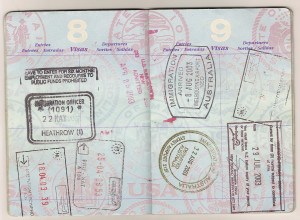By Whitney Pakalka
On April 21, 2015, the Fourth Circuit issued its published opinion in the civil case of LeBlanc v. Holder, 784 F.3d 206 (4th Cir. 2015). The court dismissed LeBlanc’s petition for review of the denial of his motion to reopen an I-130 petition for citizenship for his adult son that had been denied. Finding that the court lacked jurisdiction, and that it was not in the interest of justice to transfer the case to a district court with jurisdiction, the Fourth Circuit dismissed LeBlanc’s petition.
Factual Background and Procedural History
While working on an offshore oil rig in Nigeria from 1968 to 1978, Louisiana resident Ashton LeBlanc began a relationship with Victoria Efueye. On September 6, 1970, Victoria gave birth to their son, Robert LeBlanc. Although Ashton and Victoria never married, Robert’s birth certificate lists Ashton as the father, and Ashton acknowledged his parentage by attending Robert’s “Naming Day,” a tradition in the Nigerian culture. Ashton, Victoria, and Robert lived together as a family when Ashton lived in Nigeria, and Ashton supported his son financially.
After Robert came to the United States on a visitor’s visa in 2001, Robert and Ashton decided that Robert should remain in the country. Ashton hired attorney Stuart Snyder to facilitate Robert’s application for citizenship. Although Ashton completed a Form N-600 (Application for Certificate of Citizenship), Snyder instead filed a Form I-130 (Petition for Adjustment of Status for an Alien Relative). The I-130 was denied in May 2007 because additional necessary documents were never submitted. Snyder appealed the denial without ever filing a brief, and the Board of Immigration Appeals (BIA) denied the appeal in November 2007.
From 2007 to 2012 Snyder assured the LeBlancs that the matter was being handled. Ashton contacted another attorney in 2011 to look into the status of Robert’s case. After speaking with Snyder, the second attorney informed Ashton that the matter was being handled properly. Ashton, who is currently eighty-four years old and was anxious to see his son gain citizenship while he was alive, hired still another attorney who quickly discovered the problems with Snyder’s work. The new attorney filed a motion to reopen the denial of the I-130 petition on the grounds that Snyder provided ineffective assistance of counsel. The BIA denied the motion in November 2013, finding that Ashton failed to show due diligence after contacting the second attorney.
Jurisdiction in the Immigration Context
Under 8 U.S.C. § 1252(a)(1), a court may exercise jurisdiction in the immigration context only to review “a final order of removal,” defined as an order from the Attorney General, or an appropriate designee, “concluding that the alien is deportable or ordering deportation.” 8 U.S.C. § 1101(a)(47)(A).
The Fourth Circuit found that because the petition sought review of the denial of a motion to reopen a visa petition, and not a removal order, the court lacked jurisdiction. The Fourth Circuit was not persuaded by Ashton’s speculative contention that Robert would be subject to deportation if removal proceedings were instituted. Ashton further argued that under 8 U.S.C. § 1252(b)(5), the court of appeals is permitted to decide a claim of nationality when there is “no issue of material fact.” The Fourth Circuit noted that while this section does grant the court authority to decide nationality claims when it has jurisdiction, it does not create jurisdiction where none exists.
The Possibility of Transfer under 28 U.S.C. § 1631
Under 28 U.S.C. § 1631, when a court lacks jurisdiction over an appeal “including a petition for review, . . . the court shall, if it is in the interest of justice, transfer such action . . . to any other such court in which . . . the action could have been brought at the time it was filed or noticed.”
The Fourth Circuit adopted the Second Circuit’s test for determining whether transfer is appropriate from Ruiz v. Mukasey, 552 F.3d 269 (2d Cir. 2009). Ruiz held that transfer is appropriate when (1) the appellate court lacks jurisdiction, (2) the transferee court would have had jurisdiction over the case when it was filed, and (3) transfer is in the interest of justice. In deciding whether the interests of justice would be served by a transfer, Ruiz considered whether the appeal was filed in good faith and whether a new action brought by the appellant would be time barred.
The Fourth Circuit held that the interests of justice do not require transfer in this case because, despite Ashton’s good faith in seeking review, the remedy he sought was “fruitless.” What Ashton seeks is United States citizenship for his son, something that cannot be achieved through an I-130 petition. The Fourth Circuit concluded that “the interests of justice are best served by terminating this litigation because its continuation wastes judicial resources while moving Ashton and Robert no closer to their goal.”
Appeal Dismissed
The Fourth Circuit concluded that it lacked jurisdiction to hear Ashton’s petition for review of the BIA’s denial of his motion to reopen an I-130 petition for citizenship and that transfer to a district court with appropriate jurisdiction would not be proper under § 1631. Accordingly, it dismissed the petition.






